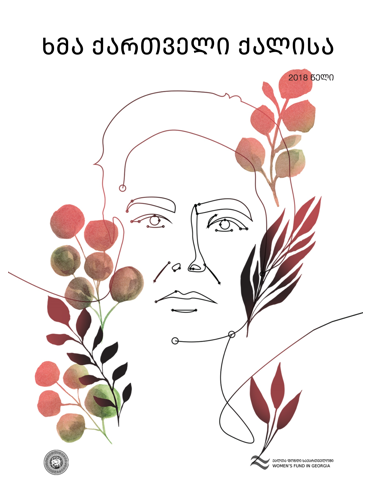Published 2021-12-30
Keywords
- ჰომოფობია,
- ქვიარ პოლიტიკა,
- ქვიარ აქტივიზმი,
- კარცერული სახელმწიფო,
- ტრანსფორმაციული მართლმსაჯულება
How to Cite
Abstract
ბოლო წლებში სულ უფრო თვალნათელი ხდება ნეოლიბერალური ქვიარ პოლიტიკის სახელმწიფოს სადამსჯელო და საპოლიციო აქტივობებში ჩართულობა და კარცერული სისტემის გაძლიერების არაპირდაპირი ხელშეწყობის ტენდენცია, რის შედეგადაც, საქართველოშიც, ჩვენ უკვე შეგვიძლია დავაკვირდეთ პოლიციის, როგორც დანაშაულის აღკვეთის უალტერნატივო სუბიექტად ფორმირების პროცესს, რომელიც მართლმსაჯულების სისტემასა და სასჯელს ზიანისა და უსამართლობის ბუნებრივ და ერთადერთ ანტიდოტად აქცევს.დანაშაულის პრევენციის გაპოლიციურების თანამდევი რისკების დასახვით, წინამდებარე სტატია კარცერული აქტივიზმის წინმსწრები კრიტიკის მცდელობაა. მასთან საფრთხის თვალსაჩინოდ წარმოდგენისთვის, სტატიაში პრობლემის ბაზისად ორი მნიშვნელოვანი საკითხი არის მოყვანილი, ერთი მხრივ, „ჰომოფობიის“ ინდივიდუალიზების, მისი აპოლიტიკურ დამოკიდებულებად ქცევის და მეორე მხრივ, ინდივიდუალიზებულ ჰომოფობიაზე დაფუძნებული სამართლის აქტივიზმის, როგორც წინააღმდეგობის ერთადერთი ფორმის კრიტიკა. სტატიაში ხაზი ესმება იმ ფაქტს, რომ ამგვარ აქტივიზმს, უალტერნატივოდ სახელმწიფოს ზედაპირული, წინასწარ განსაზღვრული დღის წესრიგი ადგენს, რომელსაც ყურადღება ჩაგვრის სტრუქტურებიდან ჩაგვრის აგენტებზე გადააქვს, რაც აუვნებელყოფს რადიკალურ წინააღმდეგობას და შეუძლებელს ხდის სისტემური ტრანსფორმაციისთვის ბრძოლას.
References
- Aghdgomelashvili, Ekaterine, From Prejudice to Equality: Attitudes, Knowledge and Information Regarding the LGBT Community and Their Rights, WISG, Tbilisi, 2016
- Bakhtadze, Keti, Unrecognized violence, WISG, Tbilisi, 2017
- Bernstein, Elizabeth, Sexual Politics of the “New Abolitionism”, Brown University and differences: A Journal of Feminist Cultural Studies, Volume 18, Number 3 doi 10.1215/10407391-2007-013, 2007, pp. 128-151
- Bernstein, Elizabeth, Militarized Humanitarianism Meets Carceral Feminism: The Politics of Sex, Rights, and Freedom in Contemporary Antitrafficking Campaigns, The University of Chicago, Journal of Women in Culture and Society 2010, vol. 36, no. 1, 2010, pp. 45-71
- Brazzell,Melanie, Positions Ourselves Intersectionally: Reading Iris Marion Young on Shared Responsibility for Oppression; The Buck Stops Where? Responsibility in the Global Economy, UCL Political Theory Conference 2014 May 21, 2014, University College of London, School of Public Policy, Session 1: Responsibility within Structures.
- Brazzell, Melanie, Responsibility for Sexual Violence: Dialogues with I.M. Young & the Community Accountability Movement, Feminism and (Political) Progress Fifth Oxford Graduate Political Theory Conference, University of Oxford, May 13-14, 2015
- Brazzel, Melanie, What would really make us safe? Transformative Justice Approaches to Harm, originally published in German as “Was macht uns sicher? Die Polizei jedenfalls nicht –der Transformative-Justice-Ansatz” in Analyse & Kritik 621, Nov. 15, 2016 www.akweb.de/ak_s/ak621/34.htm
- Bumiller, Kristin, In an Abusive State, How neoliberalism appropriated feminist movement against sexual violence, Duke University Press, Durham and London, 2008
- Cogan, C. Jeanine, The Prevention of Anti-Lesbian/Gay Hate Crimes through Social Change and Empowerement, Hate and Bias Crime: A Reader, edited by Barbara Perry, Routledge, 2003, pp.465-479
- Herek G.M. Beyond Homophobia: thinking on stigma and prejudice in 21th century
- Jalagania, Lika, Operational Guideline on the investigation and prevention crimes based on sexual orientation and gender ideintity, EMC, Tbilisi, 2017
- Kitzinger, Celia, Speaking of oppression: Psychology, Politics and the Language of Power, in Preventing Heterosexism and Homophobia edited by Esthe r D. Rothblu m Lynn e A. Bond, Sage Publications, 1996, pp.3-20
- Lamble, Sarah, Queer Investments in Punitiveness: Sexual Citizenship, Social Movements and the Expanding Carceral State in Queer Necropolitics edited by JinHaritaworn, AdiKuntsman and Silvia Posocco, Routledge, 2014, pp. 151-172
- Lamble, Sarah, Queer Necropolitics and the Expanding Carcera lState: Interrogating Sexual Investments in Punishment, Law Critique, Springer Science+Business Media Dordrecht 2013
- Law, Victoria, Against Carceral Feminism: Relying on state violence to curb domestic violence only ends up harming the most marginalized women, 2014, https://www.jacobinmag.com/2014/10/against-carceral-feminism/
- Meyer, Douge, Resisting Hate Crime Discourse: Queer and Intersectional Challenges to Neoliberal Hate CrimeLaws, CritCrim (2014) 22:113–125, DOI 10.1007/s10612-013-9228-x, Springer Science+Business Media Dordrecht 2013
- Meyer, Douge, Evaluating the Severity of Hate-motivated Violence: Intersectional Differences among LGBT Hate Crime Victims, Sociology, Sage Publicaton, 2010, 44: 980, DOI: 10.1177/0038038510375737
- Perry, Barbara, In the Name of Hate, Understanding Hate Crimes, Routledge, 2001
- Rao, Rahul, Global homocapitalism, Radical Philosophy Journal, Nov/Dec 2015, pp. 38–49
- Rexhepi, Piro, From Orientalism to Homonationalism: Queer Politics, Islamophobia, and Europeanisation in Kosovo, LGBT Activism and Europeanisation in the Post-Yugoslav Space, edited by Bojan Bilic, Palgrave Studies in European Political Sociology, 2016, pp. 179–205
- Sabedashvili, Tamar“ქალთა უფლებების ისტორიული ასპექტები“, Center for Social Sciences (CSS), 2006
- Spade D. and Willse C., Confronting the Limits of Gay Hate Crimes Activism: A Radical Critique, 21 CHICANO-LATINO L. REV. 38 (2000). pp. 38–52
- Spade, Dean, NORMAL LIFE, Administrative Violence, Critical Trans Politics, and the Limits of Law, South End Press, Brooklyn, NY, 2011
- Young, Iris Marion, Responsibility for Justice. Oxford, UK: OxfordUniv. Press, 2011. Print.

